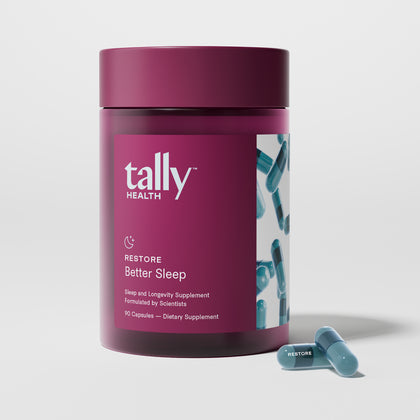

Magnesium, an abundant mineral and element in the human body, is not only present in our physiological makeup but also in the earth’s crust, comets, planets, large stars, and supernovas—lending truth to the adage that we are made of “star stuff” [1]. As an essential mineral, magnesium plays a pivotal role in hundreds of biochemical processes within the body, ranging from energy production and nerve function to maintaining a healthy heart rhythm and bolstering the immune system [2]. However, it’s estimated that up to 50% of the US population may be deficient in magnesium, a shortfall that could lead to sleep disturbances, sleep problems, health conditions, and other health problems [3].
Among the various forms of magnesium, magnesium bisglycinate stands out for its potential to cross the blood-brain barrier. This is why elemental magnesium (in the form of magnesium bisglycinate chelate complex) is a key ingredient in Tally’s sleep supplement, Restore, highlighting its significance in promoting sleep and supporting healthy aging. Let’s delve into the multifaceted benefits of magnesium for sleep and overall well-being.
What are the health benefits of magnesium?

Our bodies constantly lose magnesium due to various factors, including stress, consumption of high caffeine or sodium, sweating, certain medications, or hormonal fluctuations. Therefore, it’s crucial to ensure adequate magnesium intake, either through food sources like leafy greens, whole grains, pumpkin seeds, and a balanced diet, or by taking magnesium supplements. One effective form of magnesium is magnesium bisglycinate chelate complex, a chelated version that is chemically bonded to glycine, an amino acid. Magnesium bisglycinate has gained attention for its calming effects and is often recommended for sleep, while magnesium oxide is another form, though it is thought to be less effective for sleep due to a reduced ability to cross the blood-brain-barrier.
This chelation process enhances its stability and bioavailability, meaning it’s efficiently absorbed by the intestinal tract to replenish magnesium levels. Additionally, it tends to be gentler on the stomach, making it an excellent choice for boosting magnesium intake. When choosing a magnesium supplement, look for third party testing to ensure quality and safety.
Here are some of the sleep benefits associated with magnesium:
A 2021 meta-analysis of multiple studies found magnesium supplementation improved total sleep time by around 16 minutes and decreased sleep onset latency by 17.36 minutes in older adults with insomnia [4], which means that magnesium helped them fall asleep faster and stay asleep longer. Research suggests magnesium plays a crucial role in regulating neurotransmitters and supporting restful sleep and more restorative sleep, especially for those with sleep issues and sleep disorders.
A 2022 study—the first to demonstrate the long-term association between magnesium intake and sleep quality in young adults—found an association between magnesium intake (through both diet and supplementation) and better self-reported sleep quality. It was also linked to an increased likelihood of getting more sleep [5]. Studies suggest magnesium helps regulate circadian rhythm and supports good sleep and good sleep habits.
A 2016 study found that 400mg of magnesium supplementation improved heart rate variability (HRV), a powerful, real-time indicator of our body’s response to stress and recovery. This highlights the stress-reducing potential of magnesium intake on the nervous system [6], which could also be beneficial for supporting sleep health. Magnesium’s crucial role in nervous system regulation may help those with trouble staying asleep.
Since magnesium is involved in over 300 different bodily processes [2], it’s not surprising to see it linked to a variety of additional health benefits (apart from sleep and stress):
It improved blood sugar levels and insulin sensitivity in those at risk for type 2 diabetes [7].
It’s been linked to a lower risk of heart disease, high blood pressure, and stroke [8].
It decreased C-reactive protein levels (a marker of inflammation) in those with chronic inflammation, as well as other inflammatory biomarkers such as interleukin-6 (IL-6) [9, 10].
It significantly reduced muscle soreness and improved perceived recovery, which shows magnesium’s potential for improving athletic performance, particularly after strenuous exercise [11]. This is likely due to magnesium’s importance for muscle function and recovery. It’s also important to note that exercise increases magnesium needs by 10-20% [12].
With magnesium being paired with the amino acid glycine (aka bisglycinate), it’s also important to recognize some of glycine’s reported benefits when it comes to sleep:
It decreased wakefulness and triggered a drop in body temperature in rats, which signals the body to start producing melatonin [13].
It improved sleep efficiency, reduced sleep onset latency, and decreased daytime sleepiness in individuals with insomnia [14].
It increased serotonin levels in rats, a neurotransmitter involved in sleep regulation. Magnesium helps regulate neurotransmitters in the same way, further supporting sleep quality [15].
Magnesium: The key to living healthier, longer?

Since magnesium is pivotal to many bodily processes that keep us alive, it stands to reason that a decrease in this essential nutrient could impact how we age. A recent study found that magnesium levels were associated with all 12 hallmarks of aging and that by maintaining optimal magnesium levels as we age, we may be able to protect against these hallmarks and improve our healthspan [16].
Interestingly, one study found that adults ages 40-73 who consumed higher doses of magnesium (around 550 mg/day) had a brain age one year younger than someone who took the RDA and less age-related brain shrinkage [17]. These findings highlight the potential benefits of increasing magnesium intake with age, especially for those who may be at an increased risk for dementia.
Additionally, magnesium plays an essential role in the structure and integrity of telomeres, the protective caps at the ends of chromosomes that have been recognized as a biomarker of aging [18, 19]. One study found that magnesium intake was associated with a longer telomere length in adults with high blood pressure, especially in those over 45 [20].
A 2023 study on healthy elderly patients found that plasma magnesium levels were low in those who slept less than seven hours a night, which also impacted telomere attrition or shortening (a marker of accelerated aging). This suggests that inadequate magnesium levels could impact both sleep duration and aging in cognitively healthy older adults, while adequate magnesium may help support more restorative sleep in this population [21].
How much magnesium is necessary to help you sleep?

The Recommended Dietary Allowance (RDA) for adults is 400-420mg daily for men and 310-320mg for women (pregnancy requires around 350-360mg of magnesium daily) [22]. Magnesium-rich foods include pumpkin seeds, chia seeds, avocado, black beans, almonds, spinach, leafy greens, legumes, whole grains, tart cherry juice, and dark chocolate; however, evidence suggests our bodies only absorb about 30% of the magnesium from these food sources [23]. Consuming a balanced diet that includes a variety of magnesium-rich foods, such as leafy greens, whole grains, and pumpkin seeds, is important for meeting your magnesium needs and supporting overall health.
Magnesium supplements for sleep

Magnesium-containing supplements, such as Restore by Tally Health, make getting enough magnesium convenient. When choosing a magnesium supplement, it is important to look for products that have undergone third party testing to verify their quality and safety. Restore contains 250mg of elemental magnesium (in the form of magnesium bisglycinate chelate complex) to help improve sleep quality, sleep quantity, and to help you wake up feeling rejuvenated.
Why is magnesium important for sleep?
Magnesium helps regulate neurotransmitters, supports the circadian rhythm, and has calming effects on the nervous system—making it beneficial for falling asleep faster, improving sleep quality, and reducing nighttime wakefulness.
What type of magnesium is best for sleep?
Magnesium bisglycinate chelate complex is considered one of the best forms for sleep because it’s well-absorbed, gentle on the stomach, and can cross the blood-brain barrier, allowing it to support relaxation and sleep more effectively than other forms like magnesium oxide.
How much magnesium do adults need each day?
The Recommended Dietary Allowance (RDA) for magnesium is 400–420 mg per day for men and 310–320 mg per day for women, with slightly higher needs during pregnancy. However, most people only absorb about 30% of the magnesium from food, making supplementation a useful option.
Recommended Supplements
Citations
[1] Fiorentini, D., Cappadone, C., Farruggia, G., & Prata, C. (2021). Magnesium: Biochemistry, Nutrition, Detection, and Social Impact of Diseases Linked to Its Deficiency. Nutrients, 13(4), 1136. https://doi.org/10.3390/nu13041136
[2] National Institutes of Health, Office of Dietary Supplements. (2022). Magnesium: Fact sheet for health professionals. Retrieved from https://ods.od.nih.gov/factsheets/Magnesium-HealthProfessional/
[3] Anne Marie Uwitonze, Mohammed S. Razzaque. Role of Magnesium in Vitamin D Activation and Function. The Journal of the American Osteopathic Association, 2018; 118 (3): 181 DOI: 10.7556/jaoa.2018.037
[4] Mah, J., Pitre, T. Oral magnesium supplementation for insomnia in older adults: a Systematic Review & Meta-Analysis. BMC Complement Med Ther 21, 125 (2021). https://doi.org/10.1186/s12906-021-03297-z
[5] Zhang, Y., Chen, C., Lu, L., Knutson, K. L., Carnethon, M. R., Fly, A. D., Luo, J., Haas, D. M., Shikany, J. M., & Kahe, K. (2022). Association of magnesium intake with sleep duration and sleep quality: Findings from the CARDIA study. Sleep, 45(4). https://doi.org/10.1093/sleep/zsab276
[6] Wienecke E, Nolden C. Langzeit-HRV-Analyse zeigt Stressreduktion durch Magnesiumzufuhr [Long-term HRV analysis shows stress reduction by magnesium intake]. MMW Fortschr Med. 2016 Dec;158(Suppl 6):12-16. German. doi: 10.1007/s15006-016-9054-7. Epub 2016 Dec 8. PMID: 27933574.
[7] Kostov, K. (2019). Effects of Magnesium Deficiency on Mechanisms of Insulin Resistance in Type 2 Diabetes: Focusing on the Processes of Insulin Secretion and Signaling. International Journal of Molecular Sciences, 20(6). https://doi.org/10.3390/ijms20061351
[8] Zhao, B., Hu, L., Dong, Y., Xu, J., Wei, Y., Yu, D., Xu, J., & Zhang, W. (2019). The Effect of Magnesium Intake on Stroke Incidence: A Systematic Review and Meta-Analysis With Trial Sequential Analysis. Frontiers in Neurology, 10. https://doi.org/10.3389/fneur.2019.00852
[9] Simental-Mendia LE, Sahebkar A, Rodriguez-Moran M, Zambrano-Galvan G, Guerrero-Romero F. Effect of Magnesium Supplementation on Plasma C-reactive Protein Concentrations: A Systematic Review and Meta-Analysis of Randomized Controlled Trials. Curr Pharm Des. 2017;23(31):4678-4686. doi: 10.2174/1381612823666170525153605. PMID: 28545353.
[10] Steward CJ, Zhou Y, Keane G, Cook MD, Liu Y, Cullen T. One week of magnesium supplementation lowers IL-6, muscle soreness and increases post-exercise blood glucose in response to downhill running. Eur J Appl Physiol. 2019 Dec;119(11-12):2617-2627. doi: 10.1007/s00421-019-04238-y. Epub 2019 Oct 17. PMID: 31624951.
[11] Reno AM, Green M, Killen LG, O'Neal EK, Pritchett K, Hanson Z. Effects of Magnesium Supplementation on Muscle Soreness and Performance. J Strength Cond Res. 2022 Aug 1;36(8):2198-2203. doi: 10.1519/JSC.0000000000003827. Epub 2020 Oct 1. PMID: 33009349.
[12] Nielsen FH, Lukaski HC. Update on the relationship between magnesium and exercise. Magnes Res. 2006 Sep;19(3):180-9. PMID: 17172008.
[13] Kawai, N., Sakai, N., Okuro, M., Karakawa, S., Tsuneyoshi, Y., Kawasaki, N., Takeda, T., Bannai, M., & Nishino, S. (2015). The Sleep-Promoting and Hypothermic Effects of Glycine are Mediated by NMDA Receptors in the Suprachiasmatic Nucleus. Neuropsychopharmacology, 40(6), 1405-1416. https://doi.org/10.1038/npp.2014.326
[14] YAMADERA, W., INAGAWA, K., CHIBA, S., BANNAI, M., TAKAHASHI, M., & NAKAYAMA, K. (2007). Glycine ingestion improves subjective sleep quality in human volunteers, correlating with polysomnographic changes. Sleep and Biological Rhythms, 5(2), 126-131. https://doi.org/10.1111/j.1479-8425.2007.00262.x
[15] Bannai M, Kawai N, Nagao K, Nakano S, Matsuzawa D, Shimizu E. Oral administration of glycine increases extracellular serotonin but not dopamine in the prefrontal cortex of rats. Psychiatry Clin Neurosci. 2011 Mar;65(2):142-9. doi: 10.1111/j.1440-1819.2010.02181.x. PMID: 21414089.
[16] Dominguez LJ, Veronese N, Barbagallo M. Magnesium and the Hallmarks of Aging. Nutrients. 2024 Feb 9;16(4):496. doi: 10.3390/nu16040496. PMID: 38398820; PMCID: PMC10892939.
[17] Khawlah Alateeq, Erin I. Walsh, Nicolas Cherbuin. Dietary magnesium intake is related to larger brain volumes and lower white matter lesions with notable sex differences. European Journal of Nutrition, 2023; DOI: 10.1007/s00394-023-03123-x
[18] Maguire, D., Neytchev, O., Talwar, D., McMillan, D., & Shiels, P. G. (2018). Telomere Homeostasis: Interplay with Magnesium. International Journal of Molecular Sciences, 19(1). https://doi.org/10.3390/ijms19010157
[19] Vaiserman A, Krasnienkov D. Telomere Length as a Marker of Biological Age: State-of-the-Art, Open Issues, and Future Perspectives. Front Genet. 2021 Jan 21;11:630186. doi: 10.3389/fgene.2020.630186. PMID: 33552142; PMCID: PMC7859450.
[20] Zhao, G., Guo, D., Li, L., Yang, C., & Dong, J. (2022). The Association between Dietary Magnesium Intake and Telomere Length in Adults with Hypertension. The Journal of Nutrition, Health and Aging, 26(11), 1010-1015. https://doi.org/10.1007/s12603-022-1856-y
[21] Dhillon, V. S., Deo, P., Thomas, P., & Fenech, M. (2023). Low Magnesium in Conjunction with High Homocysteine and Less Sleep Accelerates Telomere Attrition in Healthy Elderly Australian. International Journal of Molecular Sciences, 24(2). https://doi.org/10.3390/ijms24020982
[22] Harvard T.H. Chan School of Public Health. (2023). Magnesium. Retrieved April XX, 2023, from https://www.hsph.harvard.edu/nutritionsource/magnesium/
[23] Blancquaert, L., Vervaet, C., & Derave, W. (2019). Predicting and Testing Bioavailability of Magnesium Supplements. Nutrients, 11(7). https://doi.org/10.3390/nu11071663











